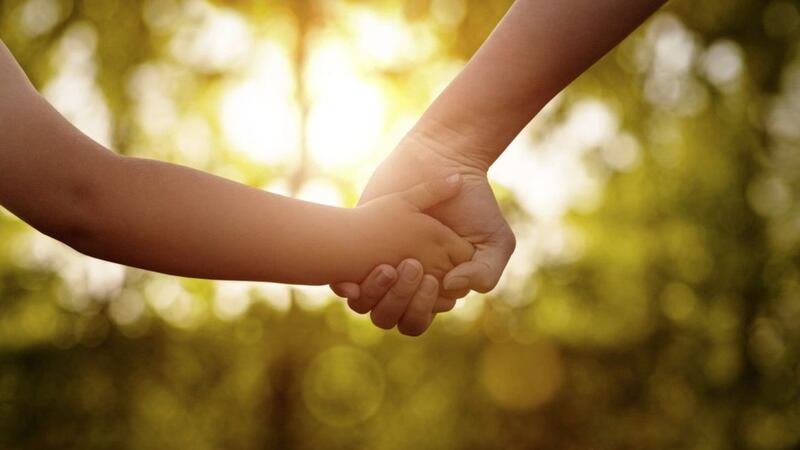A WOMAN born to a mother in a state-run mother and baby home has said the last 12 months have been "the worst period in my life but also the most important".
Ministers agreed in November to establish a public inquiry into mother and baby homes and Magdalene Laundries after a long-awaited report, published in January last year, revealed that more than 10,000 women and children, including rape and incest victims and a girl as young as 12, were sent to institutions.
Now in her mid-forties, the woman, who wished to remain anonymous to "protect my sense of self", was born in Mount Oriel Hostel in Belfast in the mid-1970s to an unmarried woman in her late teens.
"My mum delivered me, and I was taken away and left in the hospital for 11 days before going to a foster home," she said.
"I have no idea who looked after me, who fed me, who held me when I cried for my mother and no records are available."
Named Patricia at birth, her name was changed when she was adopted at the age of three months.
She said she had "developed different coping mechanisms to survive".
"I grew up always wanting to know what happened my mother, wanting to know who I looked like, did I have any brothers or sisters," she said.
"I also grew up with having to explain every time I went to the doctor, dentist, hospital that I was adopted and had no medical history.
"I grew up with comments that you don’t look like any member of your family. I grew up with bullying that I was the bastard child that no one wanted and was given away. I grew up with having to explain that I was adopted."
Mount Oriel was opened as a mother and baby home by Down Welfare Authority in 1969. The home closed in the 1980s.
Patricia, who is not part of any mother and baby advocacy group, said she grew up in a society which "conditioned me not to question adults, not to question authority or church".
"As a child I was the one that had to explain why I was ‘different’," she said.
"And when I did ask, no answers were given as it was uncomfortable to speak the truth so the replies that followed became the norm of my life and still today: ‘Sure haven’t you a wonderful family’; ‘You are better off with this family, they are so good to take on another person’s baby’; ‘If they haven’t have taken you in, just think where you could have ended up’."
A public inquiry into mother and baby homes in the north was recommended by an independent panel in October.
The independent panel made five recommendations, including that redress payments be paid to survivors at the start of an inquiry process and that all victims have access to their records.
It also recommended the creation of a non-statutory panel to allow survivors and their families to give testimony in a less adversarial format.
Work to establish the inquiry and independent panel is ongoing although no legislation can be passed or redress payments made to victims until a full executive is in place.
Patricia said working with the Victims and Survivors Service has changed her life.
"The last 12 months has been the worse period in my life, but also the most important," she said.
"I saw an advert for the truth recovery design panel for mother and baby homes and I remember my first conversation.
"I phoned to find out more information and I said: ‘I know that this is about the birth mothers but if you ever get down the line to talk about the adoptees will you let me know’.
"That’s how much I thought of myself, how much I thought people felt about adopted babies/adults. My life has changed from that conversation, I have discovered a self-worth and that my life is valuable, and that people do care that I was forcefully adopted."
She added: "The process that we are all undergoing is to find the truth. We have no or limited access to any of our records, we are still in the dark about what actually happened and how this was allowed to happen.
"There are so many people out there who don’t know they are adopted, so many children, now adults, who don’t know how to get help and support.
"We know from information gathered that some birth certificates are not even real.
"I cannot stress enough the pain and suffering we are all under.
"Support measures have been put in place and trauma counselling, this has exposed so much for me.
"It really has made me understand what I have been going through all my life, from my actions as a child subconsciously searching and knowing that I never fitted in."
She said the Executive Office must launch a communications strategy, including a series of advertisements, to let victims know that help is available.
"A lot of people don't know they can get help," she said.
A spokeswoman for the Executive Office said: "Since publication of the truth recovery design panel’s report, there has been regular detailed engagement with a number of victims and survivors that had previously been engaged by the panel.
"Effective communication and engagement with victims and survivors is a key priority for the time ahead to ensure they are kept fully informed, and have an opportunity to contribute to ongoing work."
Victims and survivors of mother and baby homes, Magdalene Laundries and workhouses can access support via the Victims and Survivors Service (VSS). To contact the VSS visit support@vssni.org, telephone 028 9031 1678 or begin a webchat at www.victimsservice.org








